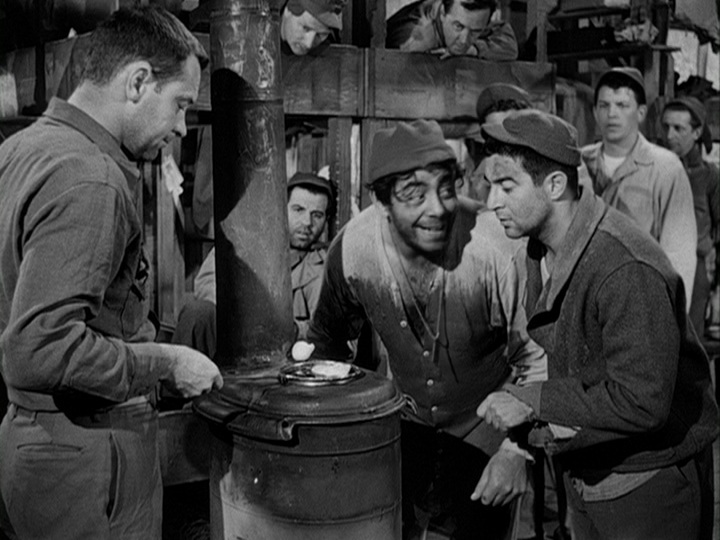Stalag 17 is Billy Wilder’s acerbic take on World War II prisoner of war movies, which, even by the early 50s, were riddled with clichés and stock characters. Adapted by Wilder and Edwin Blum from a play that Donald Bevan and Edmund Trzcinski based on their own experiences, this is a film that focuses on shades of grey rather than red, white and blue.
Set in a Luftwaffe camp for American airmen, William Holden plays Sefton, a cynical hustler who’s happy to get through the war trading cigarettes and lightbulbs, and acting as the barracks bookie. Well connected with the guards, he watches his fellow campmates attempts at escape with a wry and pitying eye, never interested in participating – so when several attempts fail, suspicion automatically falls on Sefton as the stool pigeon.
His accusers are a motley crew of characters who, thanks to Wilder and Blum’s ear for dialogue and character, might be stereotypes, but are stereotypes with a twist.
Robert Strauss’s Animal, complete with Betty Grable obsession, manages to be both funny and tragic. Meanwhile fellow director Otto Preminger oozes urbane authority as the camp Commandant and you even find yourself sympathising with camp guard Schulz, played by perennial comedy German Sig Ruman.
With the introduction of Don Taylor’s Lieutenant Dunbar, the barracks become a microcosm of American society with all its stratification and ethnic identity, and by keeping the majority of the action inside the hut, Wilder allows the claustrophobia, petty jealousies and obsessions to become magnified.
The paranoid hunt for a traitor and subsequent “trial” of Sefton have often been placed in the context of the then ongoing HUAC hearings, and turning characters that viewers had grown to like into a kangaroo court might have given at least a portion of the audience pause for thought.
Very few of Wilder’s films have been dulled by time and Stalag 17 is no exception; its mordant wit still shines and the performances still engage. Holden is at his cynical best, winning an Oscar for his performance, and the tense storyline is genuinely gripping. If you haven’t started a Billy Wilder collection – and you should – then this is a good place to begin, and a great film for any night in.
